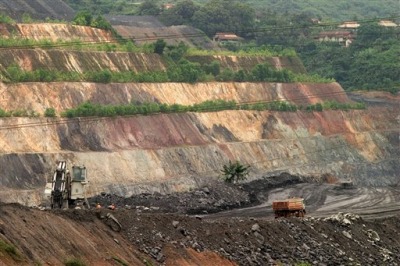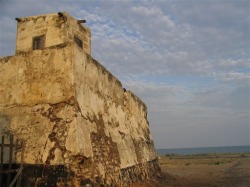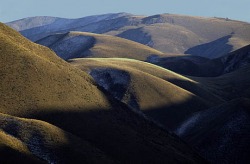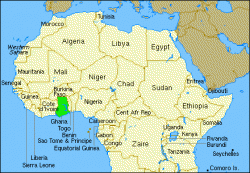Ghana: Geography & Environment
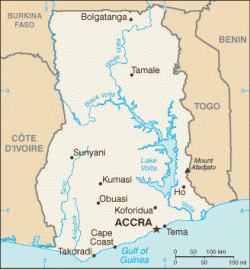
Katherine Potter
May 5, 2009
World History
Mr. Hjelmgren
Ghana: Geography & Environment
Ghana is located just north of the equator West Africa. It is bordered by Cote d’Ivoire, Togo, and Burkina Faso. It has low-lying savannah regions with a belt of rainforest across the central part. The rainfall in Ghana is heavy from April through September. The average rainfall in 43 inches in the north and 83 in the south. The coolest time of the year for Ghana is between June and September. The lowest average temperature during that time is about 79 degrees. The highest average temperature throughout the year is 88 degrees. Some of the distinguishing features in Ghana include the Volta River and Volta Lake that is one of the world’s largest man made lakes. It also provides hydroelectricity to Ghana and many of its neighboring countries Ghana has many natural resources, these include: gold, cocoa, limestone, clay, silica sand, and ivory. Some of those materials impacted the way Ghana developed.
Ghana was developed on its natural resource of gold and ivory. During the 17th and 18th century gold, ivory, and slave trade became a major impact on the society in Ghana. The Ashanti people rose to power because of the trading. These people created Kumasi, a city that was one of the most advanced cities of its time. This was all because of the trade Ghana could produce. When the Europeans discovered Ghana, they were thrilled with its abundant natural resources and its convenient rivers to travel. Therefore with the European’s arrival, they colonized Ghana.
Many people have taken advantage of Ghana’s natural resources, which has taken a toll on the country; Many of Ghana’s animals are in danger and are protected by the law. Some of these animals included: Conrava Deooi, which is a type of frog on found in the Atewa Forest. Then there is the Mylothris Atewa, which is a type of butterfly that is found nowhere else in the world. Ghana has also discovered a new type of spider tick that can be traced all the way back to the dinosaur stage. In Ghana there is a law that every person who is willing to hunt must have a license. There are some animals in Ghana that are thriving. Some of the animals are grasshoppers. Ghana has the highest diversity of Grasshoppers in their forests.
Although some of Ghana’s animals may be thriving, some of its geographical sites have changed. This is because of chemical poisoning to some of the animals and deforestation in the country. Many of Ghana’s forests are highly fragmented and disturbed. Also the climate in Ghana has changed which will seriously affect food production in Ghana (Bishop Akolgo). Many of the carbon emissions will destroy crops because they are not compatible to the living conditions that are arising around them. Today many droughts are becoming more common in Ghana, which is not good for the land.
Many people are aware of the endangered species and the risks their land is taking, so many people are taking a stand. “Save the Seashore Bird” was set up in June of 1985 for the protection of the endangered birds. There is a law being discussed due to 30% of bush meat in Ghana has been chemically poisoned due to automatic weapons and snares, as well as bush fires and poisons (Edmund Smith-Asante). “Not only is our wildlife in peril, but we are also at risk” (Agyei-Henaku). Because of these dangers the government is starting to create laws against using deadly hunting techniques. Another issue that is affecting Ghana is deforestation. Many people inside and outside of Ghana are trying to stop this problem. From the U.S. the Peace Corps have been helping but also the GACON (Ghana Association for the Conservation of Nature) has been helping the problem but more at a local level then the Peace Corps. But overall Ghana is an interesting environment and is a beautiful place to visit.
Annotated Bibliography
Reeves, Christopher. “Climate Change Would Affect Food Production” 28 April. 2009. http://climatechangetoday.wordpress.com/2008/09/18/climate-change-would-affect-food-production-isodec-director/
This website helped me with finding information on climate change and how its affecting Ghana today.
Smith-Asante, Edmund “30% of Game Killed in Ghana Through Chemical Poisoning” 2003. 28 April 2009 http://premioreprtaje.org
This website helped me with finding information environmental issues that were accruing in Ghana.
Climate” Ghana Web. 2009. Ghanaweb.com. 28 April. 2009http://www.ghanaweb.com/GhanaHomePage/geography/climate.php
This Website helped me find the average temperature of Ghana through the year.
“Ghana: Environment” World Geography. 2009. ABC-CLIO. 28 April. 2009http://www.worldgeography.abc-clio.com
This website helped me with finding information on Ghana’s environment, natural resources, agriculture, landforms and climate.
Science Daily. “New, Rare and Threatened Species Discovered In Ghana” 15 December 2007. 4 May 2009.http://www.sciencedaily.com/releases/2007/12/071206110818.htm
This website helped me find many animals that were thriving and disappearing in Ghana.
